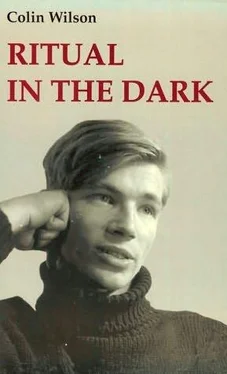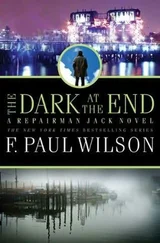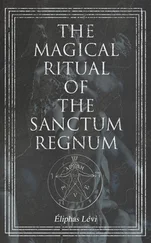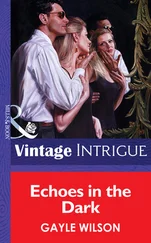Colin Wilson - Ritual in the Dark
Здесь есть возможность читать онлайн «Colin Wilson - Ritual in the Dark» весь текст электронной книги совершенно бесплатно (целиком полную версию без сокращений). В некоторых случаях можно слушать аудио, скачать через торрент в формате fb2 и присутствует краткое содержание. Жанр: Триллер, на английском языке. Описание произведения, (предисловие) а так же отзывы посетителей доступны на портале библиотеки ЛибКат.
- Название:Ritual in the Dark
- Автор:
- Жанр:
- Год:неизвестен
- ISBN:нет данных
- Рейтинг книги:4 / 5. Голосов: 1
-
Избранное:Добавить в избранное
- Отзывы:
-
Ваша оценка:
- 80
- 1
- 2
- 3
- 4
- 5
Ritual in the Dark: краткое содержание, описание и аннотация
Предлагаем к чтению аннотацию, описание, краткое содержание или предисловие (зависит от того, что написал сам автор книги «Ritual in the Dark»). Если вы не нашли необходимую информацию о книге — напишите в комментариях, мы постараемся отыскать её.
Ritual in the Dark — читать онлайн бесплатно полную книгу (весь текст) целиком
Ниже представлен текст книги, разбитый по страницам. Система сохранения места последней прочитанной страницы, позволяет с удобством читать онлайн бесплатно книгу «Ritual in the Dark», без необходимости каждый раз заново искать на чём Вы остановились. Поставьте закладку, и сможете в любой момент перейти на страницу, на которой закончили чтение.
Интервал:
Закладка:
When she bent over the filing cabinet, the outline of her pants showed clearly through the fabric, and the three clerks stared surreptitiously until she straightened up. Finally, he invited her out to the theatre and took her drinking afterwards. Later the same evening, in the Victoria Park, he knew with certainty that he did not want to possess her, that his desire had been an illusion born of boredom and the sexy innuendo of office conversation. She had probably assumed it was chivalry that had made him gently pull down her skirt after she had raised it. He was glad, three days later, to leave the office without seeing her, and contemptuous of himself for being glad.
The recollection left him feeling uncomfortable and ashamed. He finished the toasted buns and went out.
He walked the bicycle along the pavement as far as Middlesex Street, then mounted and rode slowly towards Bishopsgate. He dismissed the memories, and thought deliberately of Caroline and Gertrude; immediately he began to feel better. In Widegate Street he stared with interest at a pregnant woman who pushed a battered pram loaded with washing, and felt the release of some inner tension of smell and colour, a renewal of the excitement. He turned into Spitalfields Market and dismounted; it was impossible to ride among the people who crowded the narrow space between parked lorries and the market building. Almost immediately a man in shirtsleeves swung a net-bag of cabbage off a lorry, missing Sorme's head by a fraction. The man grinned, saying: Watch yer loaf!
Sorme grinned back, halting for a moment to avoid a trolley loaded with potato sacks.
The inner warmth was like being drunk, but without the sense of limitation.
On the corner of Brushfield Street, he stopped to consult the London atlas he carried in his saddlebag. The traffic in Commercial Street was an unbroken stream, filling the air with vibrations and the smell of diesel exhausts.
The pavement of Durward Street was barely two feet wide; the roofs, windowsills and kerbstones formed a perspective of unbroken parallel lines from one end of the road to the other. The street was deserted.
He stopped before number twelve. The brown paint on the front door had been weathered into scales.
He stood there, in front of the window, hoping to hear some movement from inside the house that would relieve his hesitation. Now he was on the point of knocking, he remembered Nunne's comments about Glasp, and the warning of the Hungarian priest.
He tried to think of the words with which he would introduce himself. Finally, he rapped loudly, and waited.
A window opened above his head. He stood back to look, hoping it would be Glasp. It was the window of the house next door. A woman asked him:
Did you want Mrs Greenberg, or the lodger?
A man called Glasp, Sorme said. He felt embarrassed, as if some guilty secret was being exposed to the whole street.
The lodger. He won't be long, the woman said. He usually goes out about this time for breakfast. I don't know which cafe he goes to.
It doesn't matter. I'll call back later.
The window slammed again. He noticed the curtains of the house opposite stir as someone looked out at him. He cycled back along the street, irritated with himself, and with the woman next door for not minding her own business. Her effect had been to make him feel an intruder.
At the end of the street, he dismounted, and leaned the bicycle against the wall, under the No Entry sign. The idea of looking for Glasp in the local cafes did not appeal to him. He looked at his watch, and decided to take a walk round the neighbourhood. It had been a long time since he walked round Whitechapel, thinking of the Jack the Ripper murders. Now, while the mood of receptivity was still on him, the prospect pleased him.
He locked the bicycle, binding the chain twice around the wheel.
Opposite the end of Durward Street was the shell of a theatre, with broken rafters and fire-blackened walls exposed. He stood, staring across at it, experiencing a desire to climb the wooden fence that hid the lower story, to pick his way across the rotten floorboards, and smell the odour of damp and decay that came from heaps of rubble. It was almost a physical craving. It puzzled him. Things were happening inside him that he found difficult to understand. It felt as if his nerves had been disconnected, then reconnected in a different order, generating new appetites and a new sensibility. He turned and walked along Vallance Road, away from the main road. He picked his way carefully across the bomb site, taking care to avoid treading on rusty barrel-hoops. Across the street, an empty school building looked as desolate as the ruined theatre; on its walls, whitewashed letters two feet high stated: Union will get rid of the Reds. At both ends of the inscription was a symbol of a lightning bolt in a circle. He crossed the road past the school, on to another strip of waste ground bordered by empty houses and stumps of broken walls, and paused for a moment to look in the windowless aperture of a disintegrating building. The floor was covered with rubble, old newspapers nibbled by mice, a torn pink brassiere. A narrow stairway, still intact, curved around the opposite wall. As he looked, a mouse ran out from among the newspapers, and disappeared into a hole in the skirting board. Someone had pointed out this house to him before; in 1943, the body of a Finnish sailor had been found on the upper floor by some children playing hide-and-seek; he had been robbed and left to die, battered by a brick swung in a silk stocking.
The house next door was still occupied; the front door stood open, and the smell of frying sausages came from it. Outside the door, a baby lay asleep in a pram.
He wandered, without aim, through the littered streets. In Hanbury Street, the new blocks of flats and the children's playground looked incongruous. He stopped again outside the barber's shop at number 29. In the yard behind the shop, the third of the Ripper's killings had taken place. He had once seen a photograph of it, taken immediately after the murders; it looked completely unchanged by the intervening seventy years. The barber looked up from shaving a customer as Sorme paused by the door. He said:
Hello. Long time no see.
Sorme said: How are you?
Fine. Never see you in here for haircuts these days.
I don't live around here now.
At the end of Hanbury Street he found himself facing Spitalfields Market again.
As he passed the Wren church, an old man came out of the public lavatory, muttering: Tanner for a cup o' tea?
Sorme fumbled in his pocket, turning his eyes away from the dewdrop that hung on the end of the man's nose. The clawed, dry-skinned hand took the two threepenny pieces; the man glanced around quickly to see if any policeman had observed him. His hand rested on Sorme's sleeve. Uncertain of what was being demanded of him, Sorme looked into the watery blue eyes. The man's voice was an indistinguishable mumble; he pointed to his feet, on which he wore grubby plimsolls. Sorme assumed he was asking for more money, and started to grope for loose change. He stopped when he caught the words:… lived here for close on seventy years.
Seventy years?
That's right. Near seventy years… I been 'ere.
He brushed at his nose with the cuff of his overcoat, and dislodged the transparent drop. Another formed immediately. Sorme averted his eyes. The overcoat was so long that its hem dragged on the pavement. He said politely:
You don't look that old.
Oh yers. Seventy-three, and worked every day of my life till I 'ad the trouble.
Sorme realised that the man was not drunk; he was talking to dispel loneliness, or perhaps out of gratitude for the sixpence. His words were scarcely distinguishable. Sorme said:
You must have been alive at the time of the Jack the Ripper murders.
Читать дальшеИнтервал:
Закладка:
Похожие книги на «Ritual in the Dark»
Представляем Вашему вниманию похожие книги на «Ritual in the Dark» списком для выбора. Мы отобрали схожую по названию и смыслу литературу в надежде предоставить читателям больше вариантов отыскать новые, интересные, ещё непрочитанные произведения.
Обсуждение, отзывы о книге «Ritual in the Dark» и просто собственные мнения читателей. Оставьте ваши комментарии, напишите, что Вы думаете о произведении, его смысле или главных героях. Укажите что конкретно понравилось, а что нет, и почему Вы так считаете.












